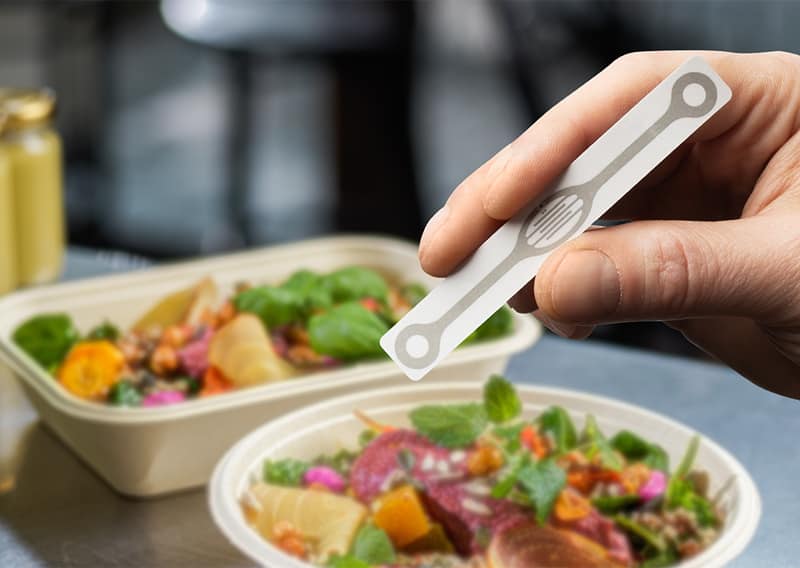Stora Enso’s ECO Meal UHF RFID tag for the food and beverage industry has a printed paper antenna and can be applied to, or built into, microwaveable packaged foods without posing a fire or arcing hazard, says the company. The tag rounds out AIPIA member Stora Enso Intelligent Packaging’s portfolio of food and beverage RFID labels, known as the ECO RFID Food & Beverage Collection.
The ECO Meal, with a paper substrate, is engineered to eliminate hazards around microwave-based arcing, the company explains, while being more sustainable than traditional plastic tags. According to Ville Voipio, Stora Enso Intelligent Packaging’s head of sales and marketing it also enables supply chain track-and-trace functionality. It is part of a family of four ECO products for food: joining ECO Hanger, ECO Stripe and ECO Cap, that enable the RFID identification of food and drinks sold at self-service stores and traditional supermarkets.
Traditional RFID tags come with an aluminum- or copper-etched RFID antenna, an integrated circuit and a polyethylene terephthalate (PET) layer on which the chip and antenna can be attached to the tag’s paper substrate. That PET plastic layer provides high strength and flexibility, but it is not recyclable, has poor absorption of water, increases soil temperature and can last for up to 1,000 years in soil. These Antennas do not break down in waste while etching with chemicals also causes manufacturing waste and carbon dioxide emissions.
ECO tags are designed to be recyclable. The printed UHF labels are in use globally for tracking apparel and fashion, as well as cosmetics and other retail applications. Until recently, Voipio says, “We’ve mainly been focusing on fashion and apparel.” During the past few years, however, the company has been moving into other sectors as the demand for RFID expands.
Food brands and traditional retailers now indicate they are seeking technology to reduce supply chain waste, improve food safety, and prevent expired or unsafe food from being sold to consumers. COVID-19 has highlighted the need for technology to help companies meet efficiency requirements and provide contactless experiences, Voipio says, as well as to manage supply chain disruptions.
The latest ECO Meal tag is designed to be attached to frozen entrees or other microwaveable packed foods. Its design includes engineering to minimize microwave energy impact, without adding material layers,says Antti Manninen, Stora Enso Intelligent Packaging’s product manager for product line tags. Using NXP Semiconductors’ UCODE chip, it measures 97mmx 13mm, has a one-year shelf life and has been tested at a TÜV Rheinland laboratory for microwave meal package safety.
The ECO Cap, also released this year, is a 30mm tag that fits on top of plastic caps. it is designed to uniquely identify plastic bottles containing water or other beverages, Manninen says. It is recyclable and comes with a built-in UCODE 8 chip.
Voipio adds, “We believe we are providing the first comprehensive sustainable RFID for food and beverage.” The product is ready to be piloted or deployed now, with volumes targeted for the third quarter of 2021.The tags are currently being assessed by several food brands.
Packaging 360 is a comprehensive knowledge sharing ecosystem for the Indian packaging industry. Our services include an online content platform to deliver news, insights and case studies; organising conferences seminars and customised training; Providing Bespoke Project Consulting, Market Research and Intelligence.







